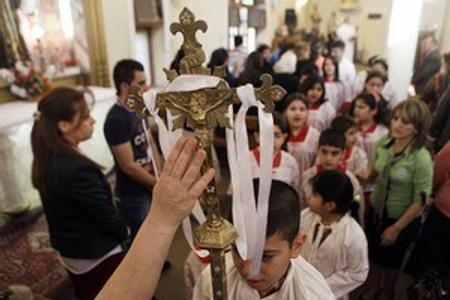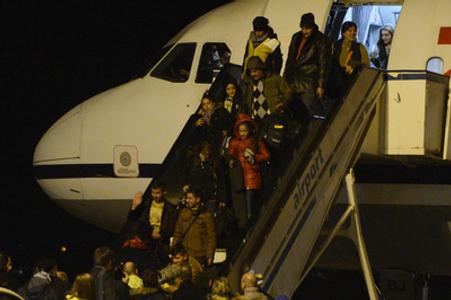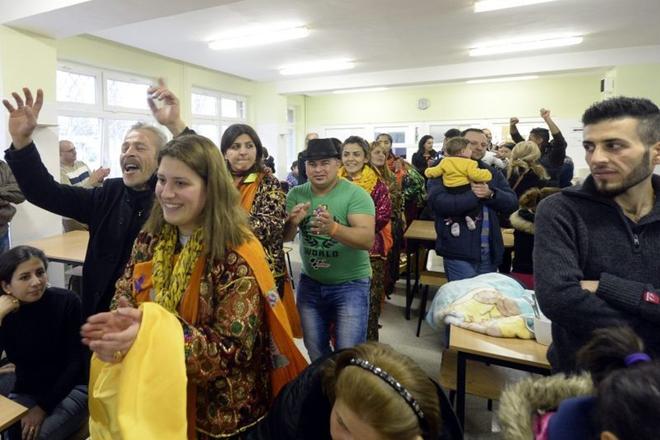In total 149 people who were checked by Slovak intelligence and do not represent any security risk for Slovakia arrived to Humenné asylum facility on December 10. They should gradually move from the camp to final accommodation facilities in the Nitra diocese, some of them provided by volunteers.
When mayors and citizens of villages learned that refugees will come to their areas they began protesting. In reaction, Prime Minister Robert Fico said that whole project would be cancelled. Despite his words, however, the Interior Ministry still wants to accommodate them in houses of volunteers.

“We are interested in their integration and they will be with families in towns and villages which are willing to accept them,” Interior Ministry spokesperson Michaela Paulenová told The Slovak Spectator. “We have integrated hundreds of people in recent years and we will not have a problem even with these 25 Christian families.”
Easier integration
Apart from the Nitra diocese, the civic association Pokoj a Dobro and Kto pomôže initiative will also provide assistance to them. They should not only provide shelter but also help with practical needs of refugees. Some of them plan to arrange meetings between them and Slovaks to help integrate them.
“Our offer is still on the table and it is in regard not only to living but also help with finding a job, learning the Slovak language and spending free time,” Kto pomôže Project Coordinator Michaela Pobudová told The Slovak Spectator.

The great advantage of such work with refugees is that they will be distributed among Slovak families, not to separated accommodation. It means that here is a significantly decreased risk that refugees will create segregated ghettos and a high probability that they will be successfully integrated into society, according to Martin Dubéci of Plea for Humanity, an initiative supporting NGOs which are helping refugees.
“The government should get on its knees and thank those volunteers because in this way there is only a small chance that refugees will create problems here,” Dubéci told The Slovak Spectator back in mid-November.
Bad conditions
NGOs focusing on refugees approached by The Slovak Spectator welcome the increased number of volunteers. They point out that the Slovak system of foreigners’ integration has serious shortcomings and volunteers can help to overcome some of them such as lack of available employment or accommodation.
In September, NGOs Human Rights League (HRL) which provides legal assistance to refugees, Caritas Slovakia which helps them to integrate in society and the Institute for Public Affairs (IVO) published a study on integration of people with international protection summing up all those problems.
They pointed out that even though Slovakia is not a popular country for refugees some of them want to stay there. However, even some of those people eventually leave the country because of insufficient conditions for living.
“We are sorry for many refugees leaving, but their situation was so bad that they had to leave,” HRL director Zuzana Števulová told The Slovak Spectator.

Insufficient state support
The Slovak government outsources its integration duties to the non-governmental sector and service organisations but they receive just a small amount of money from the state. Most financing for integration are from European funds and Slovakia covers just one-fourth of all integration expenses. Moreover, European funds run on a project system, thus when the project is over NGOs have to deal with lack of finances until a new project starts.
“People provide help to refugees as part-timers sometimes even completely for free,” Števulová said.
This is also the reason why volunteers are so important because they help refugees to learn Slovak, deal with state offices or visit a doctor for free and NGOs with limited capacities are not so overburdened, according to Emília Repáčová of Charitas Slovakia.
“There is an increasing number of such people but we cannot run on volunteers' help for a long time,” Repáčová said during a September discussion about integration organised by IVO.
Another problem is that the state changes the organisations which it works with too often. Within the last ten years five organisations provided assistance with integration of refugees. The state should have a standard programme for integration which would be available for every refugee, according to a study by NGOs.
Expensive accommodation
Finding a flat or house is a problem for Slovaks and for refugees it is even harder. With poor knowledge of the Slovak language it is hard to find a well-paid job, therefore refugees do not have enough money for suitable accommodation. consequently. many times they end up in common lodging houses. The more expensive a city is, the more complicated locating proper accommodation is.
“For a family with several members it is almost impossible to find a suitable flat in Bratislava,” IVO’s Miroslava Hlinčíková said during the debate.
Refugees also experience open discrimination. When flat owners see that they are foreigners all free places are suddenly occupied, according to NGOs.
When Castor Enrique Sanchez Rodriguez, a 50 year-old English and Spanish teacher from Columbia, finally managed to buy an apartment in Bratislava, his neighbour approached him and his friend as he walked around the building. The neighbour asked whether he was the new owner of the flat.
“When my friend told her I was [the owner], she seemed really pleased to hear that,” Rodriguez told The Slovak Spectator, adding that she responded: “Thank God! You know, a rumour has been spreading that it was bought by a Colombian guy.”
Poor Slovak language education
Ahmad is a young man who fled from Afghanistan due to war. He is not sure if he is an adult or not because he does not know his age and has no papers showing exactly how old he is. He was granted international protection in Slovakia and attends elementary school.
“My teachers in Afghanistan were not well educated people and I need to complete my studies here,” Ahmad told The Slovak Spectator.
He added that even though his Slovak is almost fluent, he realises that without perfect Slovak he can find only manual labour related work in Slovakia.
Foreigners have obligatory courses of Slovak language six hours per week during the first six months after they are granted asylum by the state. This number is insufficient, NGOs say, adding that accredited teachers usually do not teach Slovak language and their work is substituted by people from service organisations with questionable quality.
Slovak language courses are created for adults because the state presumes that children will learn the language at schools. This is an incorrect view, according to NGOs explaining that only few teachers are prepared for foreigners.
Regional school authorities also organise language courses but only rarely, according to Hlinčíková.
“Sometime parents are persuaded to not send their children there because they will learn Slovak at school anyway,” Hlinčíková said.
Struggling to find a work
Not only poor Slovak but also missing papers complicate finding a job for refugees.
“When people flee from war they usually do not take a diploma with them,” Martina Sekulová of IVO said during the discussion.
She added that Slovak authorities cannot approve education certificates from some middle-east countries due to ongoing war. Therefore they should rather focus on re-qualification programmes.
NGOs say that discrimination is also an issue when refugees are looking for work.
“Mainly women with covered heads have almost a zero chance of finding a job here,” Števulová said.



 (source: TASR)
(source: TASR)